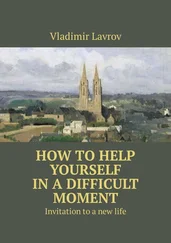My mother made a sound in the kitchen. A metal spoon clattering into a pan. I looked up and saw her turn towards my crib, checking to see if the commotion had woken me. Her eyes met mine, and seeing the tenderness of her concern, I wanted to ask her, beg her, to help me. But I had no words for what was wrong. She came in and put a hand on my head, her palm wet from cookery. “ Vsyo horosho ,” she told me, petting my hair. Everything is alright. “ Zasiypay .” Sleep, now. I swallowed the bead. Then, under my mother’s soft gesture, I lay back down and clutched my rabbit, stomach roiling. In my childish way I knew that I would never get the eye out of me now. It would spin behind my heart, and it would give birth to something. God knows when, and God knows what.
That was the beginning of me.
4.
But I want to talk about Vera. The little face hovering over my shoulder, even when she isn’t there. I want to examine the places where the line of her life passed over mine, where we crissed and crossed or ran at a distant parallel, so I can figure out how I got to where I am. Moscow to the New Jersey shoreline: hardly a straight trajectory.
I knew Vera when we were young. Before I came to America, before any of that. Not that she’d have admitted the association—even after the revolution she was out of my league by ten thousand paces. A girl with a riding crop in her hand, a girl who snuck cigarettes from soldiers and wore a new gown for the season’s every occasion. Her family was pure White Russian—the rich old guard—but even so I’m sure that all the soldiers courted her when they could. The Bolshevik Reds were still red-blooded, after all, and no one could resist a girl like that. Invited to everything, wanted everywhere. She played piano at her parents’ parties, looking up from underneath her dark eyebrows with a smile that each man in the room hoped was their secret. Lev told me that in her teen years, when it was fashionable, she wrote poetry for exile magazines and did translations by candlelight. Set typescript until her fingertips were black with ink.
I knew her, but we didn’t run in the same circles (except once, but I’ll get to that in its proper time). While she was being tutored at her family’s estate on the outskirts of Moscow, and later—having finally fled the Reds who won the war—at their dingy Paris apartment, I was educated in a string of cramped facilities paid for by the Soviet State Commissariat, perfecting my handwriting and avoiding any historical facts that might have been deemed counter-revolutionary.
My parents were on the right side of the war between the Reds and the Whites, of course—which is to say, the winning side. They embraced the changes in our country, from the ideological to the typographical, purging the aristocracy and the last remnants of Old Slavonic spelling from our lives in one fell blow. I remember when the signs and posters in the city quietly rid themselves of the tvyordi znak , a silly little mark that looked like a ъ and did—well, it didn’t do much, but the new regime understood that words and symbols meant something. That changing the language was the same as changing the fabric of reality and the shape of the human mind. It was an exciting time. Occasionally people burned their old typewriters in enormous civil bonfires. Occasionally, too, the Party called for more serious sacrifices.
There’s a reason, you see, that I didn’t stay on in the country of my birth and apprentice as something useful and hardy: a machinist, say, or a land surveyor. A reason that I am, instead, a young woman huddled in a small cabin by the seashore, scratching out stories in the terrible quiet. My parents died a few years into the new and glorious union of our country. First my father, then my mother, and all official memory of our family as a unit. At fifteen I was taken to an orphanage—a bleakness that I’ve worked hard to scrub from my mind, without success—and then at sixteen was smuggled into the U.S. on a hush-hush transport ship along with a hundred other children, all of us plucked from our uncomfortable beds and promised a better life, which we needed very much.
What do I remember of the orphanage? The shock of being there. The cross-stitched portraits of Party members framed and hung along the walls, with eyes that watched you move around. It was considered beneficial for us to work on those cross-stitches together in the common room no matter how badly we sewed, and even once I landed on the transport ship I felt pricks in my inept fingers and thumbs from where my needle had pierced the skin. In the orphanage we were told how lucky we were to be raised not by parents but by the motherland herself, and our caretakers frequently used this excuse to smack us into place when we strayed. Rulers sharp on the back of the hand, backs of hands across the cheek, all in an effort to vouchsafe not only our own futures but also those of the Party and the bratstvo, the brotherhood of all mankind. I remember being hungry. I remember a great many dark walkways, blank and featureless faces. And then I remember being carried out in someone’s arms, and told I was going to sail for America.
A beautiful voice offered me amber fields and purple mountains. Majesty. I had studied English in school, but still I assumed there was some misunderstanding, because who would bother giving anything like that to me? A new home. A new life. I didn’t know then that the mountains and fields were just lines in a song, which the man hurrying me towards the boat was probably singing to keep himself warm: it was a bitter evening. But I decided to put my faith in this new place, just in case. I figured it had to be better than fighting to remain where I’d been.
5.
We didn’t have an easy time getting there, though. During our voyage to America, waves of flu swept through the ship and bad weather dogged us. The girl who shared my bunk turned green within a day of setting sail, and took to moaning and shivering beneath our quilt, asking for death. Little Marlenochka. I spent hours trying to find a spot of healthy pink on her skin to report to her in the hopes of earning a smile, sometimes searching from her hairline to the soles of her feet with no success. The attention didn’t soothe her much, even as I scratched her gently with my fingernails and traced her ear with my thumb. She heaved up what seemed like gallons of saltwater, though of course that can’t be right, since I never saw her eat more than a few bites of dry cracker, or drink more than a sip of bouillon tea. I can’t imagine what became of her after we landed. She was so briny, so continually moist. And not alone in that. The bunkrooms belowdecks stank of vomit, and those of us who could still walk would stroll the deck for hours in search of a clean breath of air. But it was slippery up there, and we were weak; many children disappeared without a whisper. I didn’t get sick until halfway through the trip, but I remember trembling against the rail of the ship, staring into the ocean and seeing, to my utter shock, the dinner-plate eye of a whale rise up just a few feet away, clear though untouchable. Was it, I wondered, a hallucination? Certainly it seemed unreal. The eye was wet with tears and seawater, full of sympathy I’d never earned or even dreamed of. The giant grey body moved beside us silently, ruffling the water like it was rearranging a blanket. I began to cry, and then to pray to this giant creature—badly, I’m sure, having never prayed before. The waves were colorless, and I reached towards them. Then the whale sank out of view.
Despite the hardships we faced in transit, my faith in the American promise remained unshaken. Altered, perhaps, when there was found to be a shortage of aspirin on board, and our fevers were treated with rest and stale tea. Further transformed when we arrived at port and were told that, for reasons of national security, we might not be allowed to disembark. But this only made me more eager to kiss the American soil when I finally stepped down onto it. Everyone smiled at you in America, whether or not they meant it. I found that interesting.
Читать дальше












